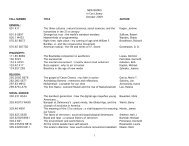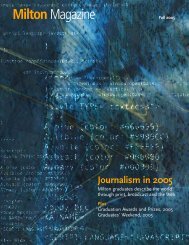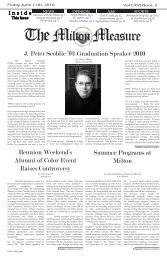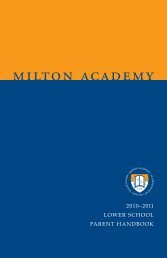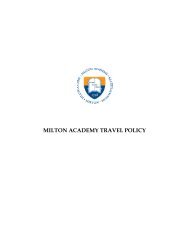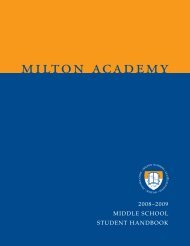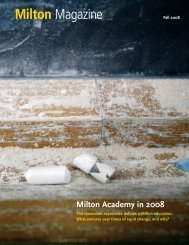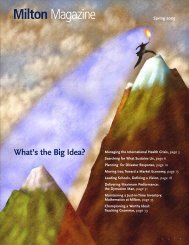Spring 2007 - Milton Academy
Spring 2007 - Milton Academy
Spring 2007 - Milton Academy
- No tags were found...
You also want an ePaper? Increase the reach of your titles
YUMPU automatically turns print PDFs into web optimized ePapers that Google loves.
seeds of a new way of being for humanson our planet,” he explains. “I have beenfortunate in planting some seeds thathave blossomed over the years workingwith Volunteers in Asia, Greenpeaceand the U.S. Agency for InternationalDevelopment–funded Biodiversity SupportProgram.”Founded in 1994, Forest Ethics is a nonprofitenvironmental organization withstaff in Canada, the United States andChile. Its mission is to “protect endangeredforests by transforming the paperand wood industries in North America andby supporting forest communities in thedevelopment of conservation-basedeconomies.”A boreal forest ecosystem, as describedon Borealnet.org, is “the contiguous greenbelt of conifer and deciduous trees thatencircles a large portion of the NorthernHemisphere. In North America, the borealforest stretches across most of northernCanada and into Alaska. It has long beenidentified as one of the world’s three greatforest ecosystems.” According to Lafcadio,boreal forest accounts for about 25 percentof the world’s remaining intact or roadlessforest ecosystems and is one of the planet’skey regulators of global climate change.To protect boreal forest ecosystems andothers like them, Forest Ethics determineswhich companies purchase the productsthat hasten the destruction of these forests.“We run market campaigns that identifylarge branded customers of forest productsand work collaboratively with them tochange what they’re buying,” Lafcadioexplains. The organization also teachesthese corporations “how to leverage theirpurchases and influence into new protectedareas, better forest management policies,and conservation economies in keyendangered forest regions.”Large companies such as Staples, HomeDepot and Dell use these trees for paper,lumber or furniture. Victoria’s Secret, forinstance, mails nearly one million catalogueseach day, catalogues that are printedon paper created from the trees of thisendangered area. From Forest Ethics’perspective, this practice was a ripe opportunityfor intervention. “We used publiccampaigning to expose the effects of [thecompany’s] consumption and negotiatedsolutions,” Lafcadio says. “We then convincedthem to adopt a leadership policywith regard to procurement. They agreedto take action and reduce consumption, tobegin using 10 percent recycled fiber intheir paper, and to ensure that the remainingvirgin fiber does not come from ecologicallysignificant areas that requireprotection.” An article in the December 7,2006, issue of the Wall Street Journal highlightedForest Ethics’ work on this campaignand the agreement of LimitedBrands Incorporated (Victoria’s Secret’sparent company)—as well as similar agreementsForest Ethics has secured with Delland Williams-Sonoma—to shift the catalogueindustry and help it “go green.”“If a corporation refuses to change its practices,we hold it publicly accountable—with media stories, street demonstrations,online strategies and paid media or advertisements,”Lafcadio explains. “When companiesrecognize their impact and takeresponsibility, we help them find alternatives,invent new ways of doing businessand implement sound policies throughour Corporate Action Program. Either way,we work to turn potential corporate adversariesinto allies. Logging companies listento their largest customers. Many of thesecustomers, in turn, recognize that theircompany values, and those of their owncustomer base, call for demonstratingenvironmental and social leadership.”To date, Forest Ethics has led initiativesthat have resulted in the protection of overseven million acres of endangered forest inBritish Columbia and Chile.www.forestethics.orgEEHLafcadio Cortesi ’7924 <strong>Milton</strong> Magazine



